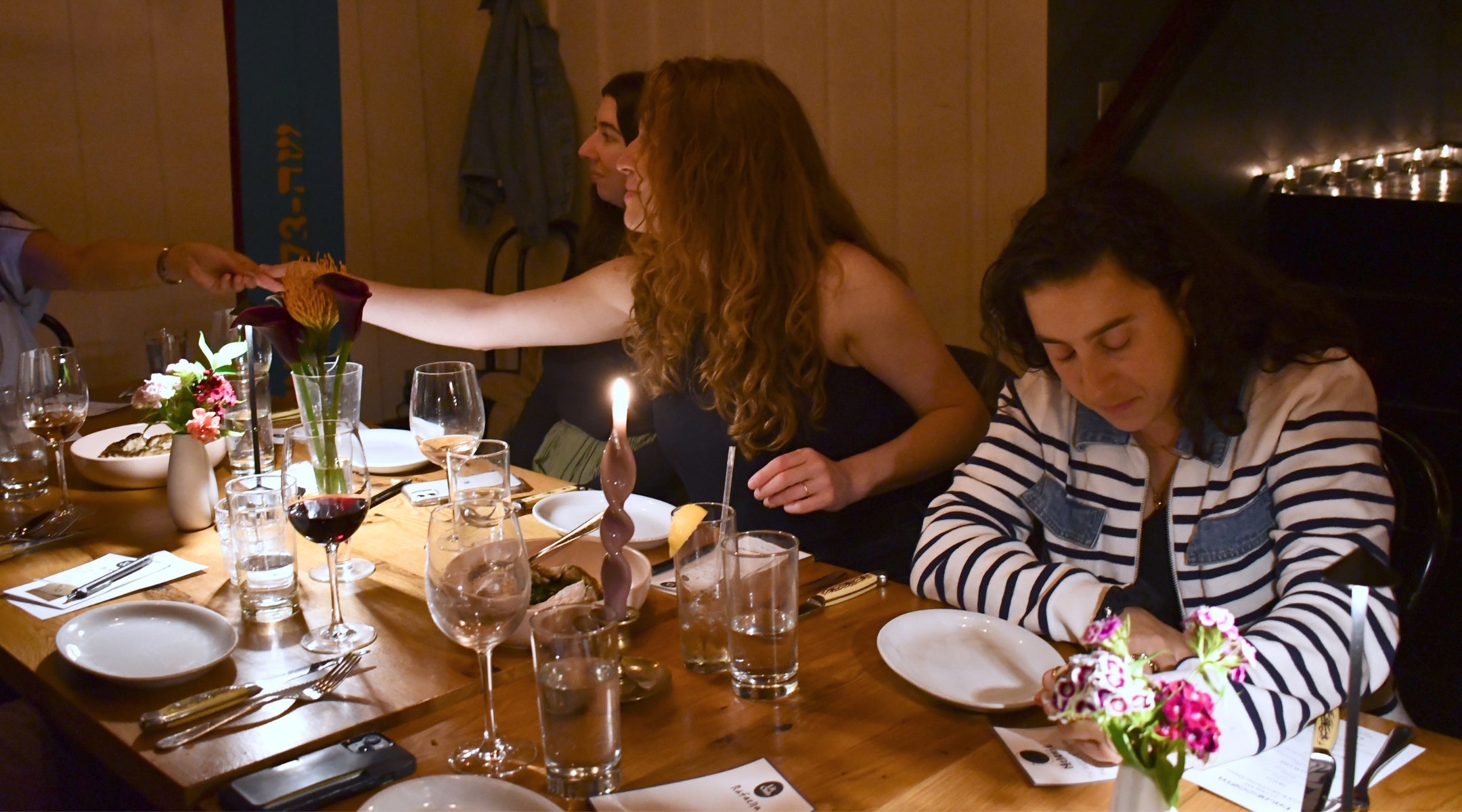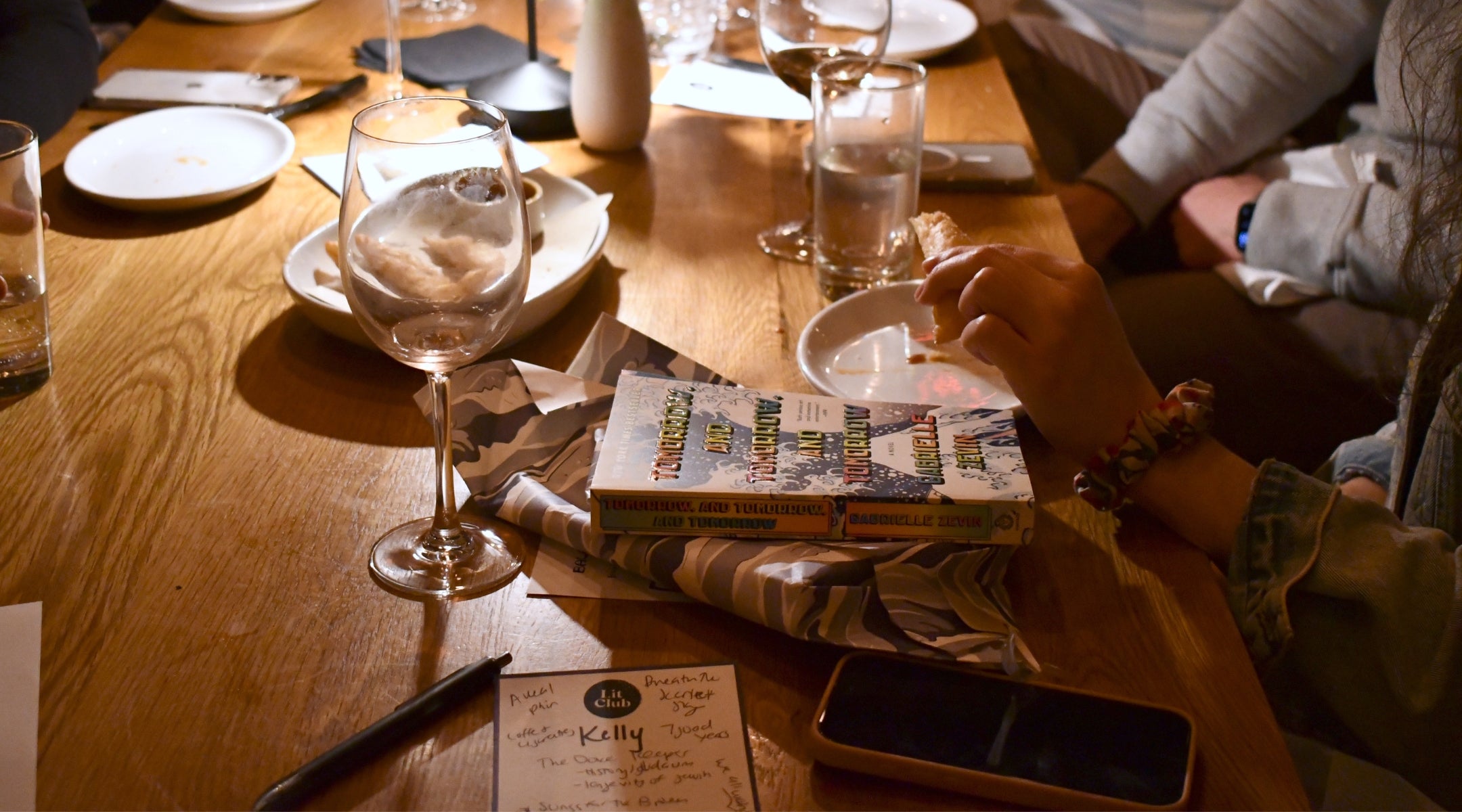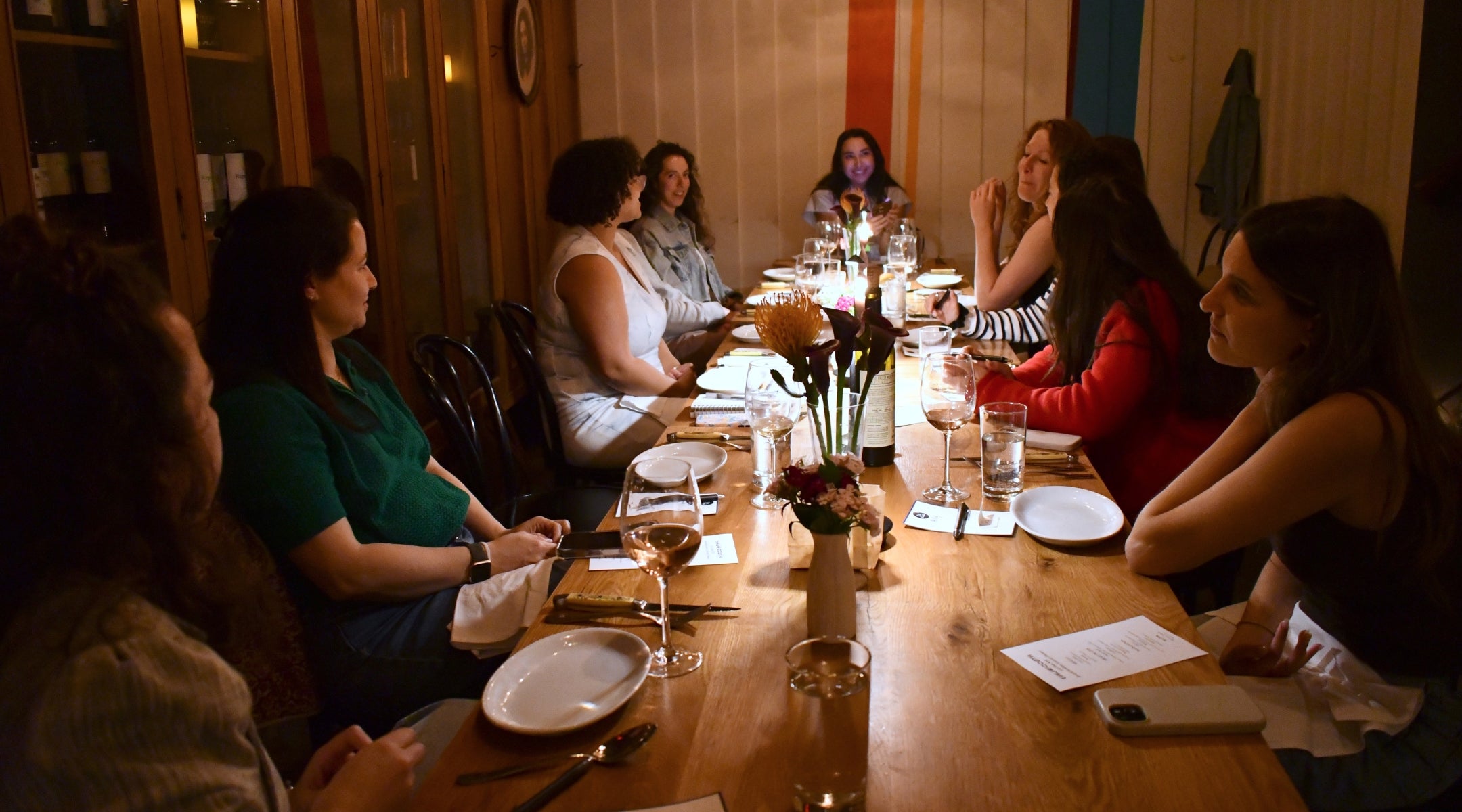Kelly Chervin’s book club doesn’t usually discuss what it means to be Jewish.
But over a candlelit dinner last week in the basement of Balaboosta, an Israeli restaurant in the West Village, a dozen Lit Club attendees explored themes of Jewish identity, memory, diaspora and history. The conversation was wide-ranging and highly personal, even though many of the participants had just met for the first time.
A former teacher-turned-tech worker, Chervin, 33, founded Lit Club — an unconventional book club with no real requirements except a willingness to talk about literature and have an open mind — in March. Though still fledgling, Chervin has already organized roughly four or five events each month, including in-person and virtual book clubs, literary dinners and meetups for Latinas who are avid readers.
Chervin calls Lit Club a “low lift” book club, because there is no set time by which everyone is expected to finish reading the same book. There is no formal membership (most learn about events through word-of-mouth, Instagram or Substack), and anywhere from five to a dozen or so people attend any given event, some of which are free, and some are ticketed, such as the dinners. Though most meetups require each participant to bring a book of their own choice, Lit Club has occasionally assigned one book for everyone to read, such as “James” by Percival Everett (a retelling of Mark Twain’s “The Adventures of Huckleberry Finn”) and “Martyr!” the novel by Kaveh Akbar that was shortlisted for the National Book Award for fiction in 2024.
For the month of May, which is also Jewish American Heritage Month, Chervin had a new idea: a Jewish literary dinner, held at a Jewish-owned restaurant. Participants were tasked with bringing a book that is “shaping your understanding of Jewishness — whether through heritage, diaspora, ritual, memory, or identity.”
The idea for the dinner, Chervin said, stemmed from her urgent need to feel connected to other Jews after Oct. 7 in a judgment-free and non-religious space.
“There are a lot of Jewish folks I know that are hungry for a safe space for Jewish-identifying folks to wrestle with these larger questions about our identity, and what it means to be Jewish in 2025, right now, when our larger culture is so quick and fraught to make any judgments about even just mentioning your identity,” Chervin, who lives on the Upper West Side, said.
“Right now, to even mention that you are proud and Jewish, it’s so easily weaponized to make X, Y, Z assumption about you, your political beliefs, about what you stand for, about your morals, about your sense of citizenship,” she added. “And to a degree, that is quite unjust.”
Chervin herself is Puerto Rican on her mother’s side and Jewish on her father’s side. “I’m a white Latina, and I’ve always had these big questions about identity,” she said.
But she was far from the only person exploring multiple parts of her identity on Tuesday night.
Several attendees grew up in interfaith households or were married to non-Jewish spouses. Most were in their late 20s to early 40s. Two participants were parents, very few were synagogue attendees — but everyone was looking for connection to other Jews.

Guests play a round of Jewish author trivia at Lit Club. (Jackie Hajdenberg)
August Laska, a plant shop owner living on the Upper West Side, was the sole male in attendance that evening. He had grown up in a progressive community in Connecticut that he says was supportive when he came out as gay while he was “very young.” But he said he never quite felt like he belonged religiously, and his family bounced between the local Conservative synagogue and Chabad.
“I am rediscovering what it means to be Jewish as an adult, and going to two Jewish events two days in a row, I think really solidified that for me,” said Laska, who had attended the Jewish Queer Youth Gala on Monday evening, where where Rachel Sussman, the Tony Award-winning producer of “Suffs” and other shows, was honored for her work.
“I’m learning that I’m not just Jewish,” Laska said. “I am Jewish and something else; and a lot of other things, actually. I think that’s what I’m learning to be as an adult. It’s like, Jewish ‘and’ — Jewish and gay, or Jewish and a business owner, or Jewish and something else that I still have yet to figure out.”
Laska said he appreciated the diversity of perspectives brought together by the event. The book he brought was called “The Amazing Adventures of the Jewish People,” a nonfiction chronological history of the Jewish people published in 1984.
“We all brought such wildly different books, which I think was cool,” he said.
Though the dinner was held at a restaurant owned by Israeli Chef Einat Admony, Chervin emphasized that the gathering wasn’t political, and that Lit Club does not take political stances. Of course, the ongoing war between Israel and Hamas was a frequent, if roundabout topic — the deadly conflict was frequently and vaguely referred to as “everything going on.”
Occasionally, participants recommended books that referred to topics like Israeli nationality and Palestinian displacement, like “The Lemon Tree,” a nonfiction work by Sandy Tolan that tells the story of an Israeli woman who learns about the Palestinian family that previously lived in the house she grew up in.
But for the most part, attendees stuck to Jewish stories that did not touch on the subject. Nonetheless, nearly all of them were rooted in history, such as “The Dovekeeper,” an Alice Hoffman novel about the siege of Masada in 70 CE; “Number the Stars,” a popular young adult novel by Lois Lowry about a Jewish family’s escape from Copenhagen during the Holocaust; “Songs for the Brokenhearted” by Ayelet Tsabari, about the Yemenite experience in Israel in the 1950s, and “Everything Is Illuminated,” Jonathan Safran Foer’s autobiographical retelling of a visit to his grandfather’s shtetl.
These recommendations were served in between glasses of wine and courses of hummus, fried olives in labneh, branzino, chicken, tahdig (Persian crispy rice) and malawach churros (a fried Yemenite dough deep-fried again into the likeness of a churro). The evening concluded with a Jewish author trivia game where two winners got to take home a prize — the prize being, of course, a book. (Both “Tomorrow, and Tomorrow, and Tomorrow” by Gabrielle Zevin and Art Spiegelman’s graphic novel, “Maus,” were given away).

A copy of Gabrielle Zevin’s “Tomorrow, and Tomorrow, and Tomorrow” is one of the prizes for winners of Lit Club’s Jewish author trivia. (Jackie Hajdenberg)
For Lisa Ruskin, the mother of a 1-year-old, the Lit Club meeting was a chance to reconnect with material she had loved as a teenager and young adult. She minored in English in college, she said, and loved literature classes in high school.
“There are so few spaces to discuss books like this, so part of me is just excited to intellectually connect with other people on the topic,” Ruskin, who lives in Park Slope and brought “Everything Is Illuminated,” said. “I feel very much like I’m a secular Jewish person, and it’s hard to find a Jewish community that feels right. I don’t want something overtly religious, but I also want to be able to find who I relate to, and this felt like a fun, low-stakes way to interact with Judaism.”
Ruskin said she especially appreciated being in a space with different viewpoints, where everyone was wrestling with the same subjects in different ways.
“There are very few civil places to disagree,” she said. “And I feel like we didn’t really get too far into a lot of that, but still, you could tell people were coming from different places in terms of, especially, current events. And it was just nice to be in that kind of space and not have to be combative.”
She added: “Just to have a space with other Jewish New Yorkers to just explore these ideas — I don’t have an outlet for that, and I feel like I found that, and that was really fantastic.”
Chervin said she plans to hold another Jewish-oriented Lit Club event soon.
“Definitely hoping for another, for sure,” she said. “Definitely planning on creating another space for Jewish readers, whether Shabbat literary dinner, author talks or more themed nights.”
The New York Jewish Week brings you the stories behind the headlines, keeping you connected to Jewish life in New York. Help sustain the reporting you trust by donating today.





